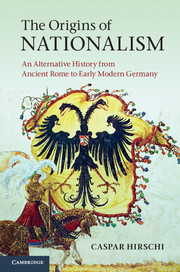Book contents
- Frontmatter
- Contents
- Figures
- Preface
- 1 Introduction
- 2 The modernist paradigm: strengths and weaknesses
- 3 Foundations of a new nationalism theory
- 4 Killing and dying for love: the common fatherland
- 5 Competing for honour: the making of nations in late medieval Europe
- 6 The nationalist transformation of borders and languages
- 7 Humanist nationalism
- 8 A German Emperor for the German people
- 9 Nation and denomination
- 10 Conclusion
- Bibliography of works cited
- Index
10 - Conclusion
Published online by Cambridge University Press: 05 June 2012
- Frontmatter
- Contents
- Figures
- Preface
- 1 Introduction
- 2 The modernist paradigm: strengths and weaknesses
- 3 Foundations of a new nationalism theory
- 4 Killing and dying for love: the common fatherland
- 5 Competing for honour: the making of nations in late medieval Europe
- 6 The nationalist transformation of borders and languages
- 7 Humanist nationalism
- 8 A German Emperor for the German people
- 9 Nation and denomination
- 10 Conclusion
- Bibliography of works cited
- Index
Summary
After having demonstrated the utility of men of letters in relation to the laws & customs, let us say a word about the external advantages the state takes from them. This advantage, which is so envied among individuals, is no less envied among nations.
Jean-Jacques Garnier, The Man of Letters, 1764In an enlightened century, in a century in which each citizen can speak to the entire nation by means of print, those who have the talent for instructing men and the gift of moving them – men of letters, in a word – are, among the dispersed public, what the orators of Rome and Athens were in the midsts of the public assembly.
Guillaume-Chrétien de Lamoignon de Malesherbes, Speech Given in a Public Session of the French Academy, 1775This book closes in a period of history where most other studies on the origins of nationalism do not even begin. In the eyes of the leading ‘modernist’ theoreticians of nationalism, the Reformation era may look like the Île de la Cité observed from the Eiffel Tower: very distant and very irrelevant. But just as the Île de la Cité is of greater significance to the making of Paris than the Eiffel Tower, I would argue that the distant periods covered in this book are more central to the making of nations and nationalism than the more conspicuous history of modernity.
Instead of repeating the main points of this book in the conclusion, I prefer to present some general reflections on the significance of early modern history – that is, roughly speaking, the period from the German Reformation to the French Revolution – for the emergence of modern nationalism. In recent years, a number of historians have identified the Hebrew Bible as ‘the chief inspiration of nationalism’ and the English Protestants of the early modern period as the first to be inspired. They argue that the example of the ‘chosen people’ in the Old Testament, widely propagated through cheaply printed vernacular bibles and prayer books, created a homogeneous religious-cum-national identity, which, based on its radical exclusion of Catholics, became the foundation of modern nationalism. I agree that the Bible was an important resource for the construction of national myths – before and after the Reformation, both in and out of England – and that the period of confessionalisation played a crucial role in the transformation from pre-modern to modern nationalism. However, I also believe that by relating the origins of nationalism to the Hebrew Bible and by treating nationalism as a modernised form of religious ‘identity’, the baby is thrown out with the bath water. This book has tried to demonstrate that it is vital to distinguish nationalism from religion as clearly as possible in order to understand its cultural and political significance in both the past and the present. How the relation between nationalism and religion during the confessional age can be described in a more nuanced way will be the subject of the first part of this conclusion.
- Type
- Chapter
- Information
- The Origins of NationalismAn Alternative History from Ancient Rome to Early Modern Germany, pp. 212 - 220Publisher: Cambridge University PressPrint publication year: 2011

